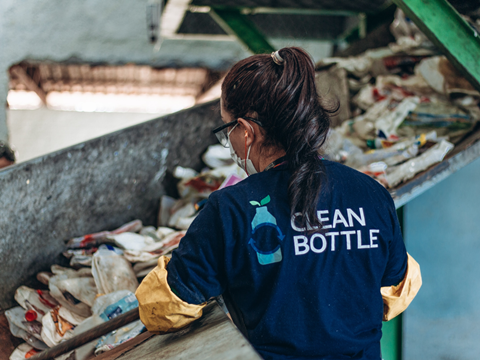
In its efforts to supply recycled packaging on South American markets, ALPLA has acquired a majority stake in Clean Bottle, which reports an annual capacity of 15,000 tonnes of rHDPE at its plant in São José dos Pinhais.
ALPLA already claims to use approximately 32% post-consumer recycled material in its HDPE packaging production in Brazil. Now its strategic investment in Clean Bottle is expected to bring it closer to its global recycling goals.
These include ensuring that 25% of its total processed material will be post-consumer recycled and achieving 100% recyclable packaging solutions by 2025. It also plans to double its installed and planned output capacity to 700,000 tonnes of recycled material by 2030.
“Brazil is the beginning of our recycling activities in South America and therefore the choice of partner is of key importance,” says Christoph Schneider, ALPLA’s regional managing director South America (SOAM). “Clean Bottle is an established manufacturer and, as a long-standing supplier, shares our quality standards.”
“Demand for sustainable packaging solutions made from recycled plastic is growing on all continents,” explains Dietmar Marin, managing director at ALPLArecycling. “Our customers want to reduce their CO2 consumption and we support them in doing so.
“By investing in Clean Bottle, we are securing the long-term supply of our plants in Brazil with our own high-quality post-consumer recycled material (PCR).”
Apparently, Clean Bottle’s 15,000 square-metre recycling plant in São José dos Pinhais, Paraná, operates on a modern infrastructure, self-sufficient rainwater treatment, and ‘the highest quality’ standards. It claims to be capable of producing 15,000 tonnes of recycled HDPE every year.
ALPLA’s acquisition of a majority stake makes Clean Bottle a joint venture between ALPLArecycling and the previous sole owners, partially managed by Clean Bottle founders Leandro Tanaka and Jadir Voltoline Junior.
The venture has been contractually agreed by all parties, but competition law approvals are still pending and the conditions were not disclosed.
“For over 35 years, we have seen ourselves as a link in the circular economy, adding value to used plastics,” Tanaka adds. “With this vision, we have established ourselves as a strong partner for the packaging industry and society. Together with ALPLArecycling, we are now taking the next step and want to grow together.”
The news comes after ALPLA entered a strategic partnership with Re-Purpose last summer, aiming to improve local waste collection and supply ALPLA’s PET recycling facility in Ballito. Over 35,000 tonnes of rPET are expected to produced from the beginning of 2025.
ALPLA acquired Heinlein Plastik-Technik shortly after, planning to utilize its production site’s injection moulding technologies and assembly machines to expand its pharma division with closure systems, dosing systems, and application aids.
Later in 2024, Toppan sought to expand its sustainable packaging operations into the Americas with its acquisition of Sonoco’s Thermoformed & Flexible Packaging business. The move hoped to combine Toppan’s technical expertise and manufacturing capabilities with Sonoco’s sales network, customer base, and solution development capabilities in the region.
If you liked this story, you might also enjoy:
Reuse vs. single use – which is better for the environment?
Sustainable Innovation Report 2025: Current trends and future priorities
What can the world learn from South Korea’s world-leading performance in plastics circularity?














No comments yet